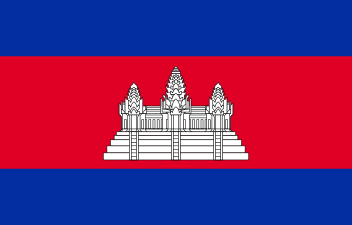Cambodian Canadians
| Total population | |
|---|---|
|
(34,340 (0.1% of Canada's population)) | |
| Regions with significant populations | |
|
Montreal, Quebec (6,110), Ontario, Alberta | |
| Languages | |
| Khmer, Quebec French, Cambodian French, Canadian English | |
| Religion | |
|
majority: Theravada Buddhism, minority:Roman Catholic | |
| Related ethnic groups | |
| Cambodians, Cambodian Americans |
Cambodian Canadians, also known as Khmer Canadians, are Canadians of Cambodian ethnic origin or ancestry. According to the 2011 national census, Canada had recorded a Cambodian-Canadian population of 34,340,[1][2] translating into 0.74% of the Asian-Canadian population of 4,659,395, making them one of the smallest minority groups of Asian ancestry.
Many Cambodian-Canadians are bilingual due to France also having a historical influence on Cambodia, whose second official language (during the time of French colonization) was French. Christianity and cultural Buddhism are also the two major religions in which Cambodian-Canadians follow.
History
During the Khmer Rouge genocide of 1975-1979, Cambodians of many ethnic backgrounds escaped to refugee camps in the neighboring countries of Thailand and Vietnam. Due to the mass amount of refugees, many Cambodians migrated to Canada, USA, France and Australia. In 1981 there were 13,000 Cambodian-Canadian Refugees, [3] with most of the population settling into major cities such as Montreal, Toronto, Ottawa, Calgary, Edmonton and Quebec City. The Jane and Finch neighbourhood of Toronto has a notably large Cambodian population, in which they make up about 4% of the community.[4]
Demographics
| Province or territory | Cambodian Canadians |
|---|---|
| | 14,695 |
| | 12,620 |
| | 3,555 |
| | 2,385 |
| | 80 |
| | 345 |
| | 0 |
| | 0 |
| | 10 |
| | 0 |
| | 0 |
| | 0 |
| | 0 |
| | 34,340[1][5] |
Religion
Cambodians are formally known as Theravada Buddhists, but follow a mix of a cultural adaptation of Buddhism and ancient religious views and principles. Ever since Cambodia was under French colonization, the amount of Christian followers among Cambodian populations has also increased, leading to several Cambodian-Christian establishments throughout Ontario. Buddhist followers however pray throughout the year, with the celebration of Khmer New Year lasting three days centered around the 13th of April.
The religious festival of Pchum Ben, also known as Ancestor's Day, is the remembrance of the deceased. On this day is when Cambodians pay their respects to deceased relatives and ancestors. On Ancestor's day, people would offer food to the monks, who would then give their blessings to the people and their ancestors. The significance of food to this festival correlates with the belief that the ghosts of their ancestors will receive it.
Organizations
In 1979, members of the Cambodian-Canadian community established the CCAO (Cambodian-Canadian Association of Ontario), alongside other notable community organizations such as the Khmer Buddhist Group.
Notable people
- Honey Cocaine, rapper
- Ellen Wong, actress
See also
References
- 1 2 NHS Profile, Canada, 2011, Statistics Canada
- ↑ http://www12.statcan.ca/census-recensement/2006/dp-pd/hlt/97-562/pages/page.cfm?Lang=E&Geo=PR&Code=01&Data=Count&Table=2&StartRec=1&Sort=3&Display=All&CSDFilter=5000
- ↑ http://www.photius.com/countries/cambodia/society/cambodia_society_migration_and_refuge~1.html
- ↑ NHS Profile, 0312.02, Ontario, 2011, Statistics Canada
- ↑ http://www12.statcan.ca/census-recensement/2006/dp-pd/tbt/Rp-eng.cfm?TABID=1&LANG=E&APATH=3&DETAIL=0&DIM=0&FL=A&FREE=0&GC=0&GK=0&GRP=1&PID=89424&PRID=0&PTYPE=88971,97154&S=0&SHOWALL=0&SUB=0&Temporal=2006&THEME=72&VID=0&VNAMEE=&VNAMEF=
